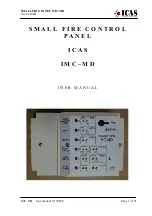
SCC-001 V1.1 07/19
Page 3
©4QD Ltd www.4qd.co.uk
4. Calibration
It may be necessary to calibrate the sound card to match its zero speed point to the
zero speed output of the SCC-001.
The process below describes how to do this for the ESS-Dual, it may differ for other
sound cards.
1. Switch on the DNO and the ESS-Dual.
2. Press and hold the + on the ESS-Dual until it gives a long beep to denote it
has entered calibration mode.
3. Set the DNO to zero speed, press the + again to store the zero point.
4. Set the DNO to full ahead, give it time to reach full speed, now press +
again to store the full ahead point.
5. Set the DNO to zero speed, give it time to stop, now press + again to store
the reverse point. The ESS-Dual should now give another long beep and
enter operating mode.
5. Auto-off
The ESS-Dual has an auto off function that switches the sound off after a preset time.
We have found it useful to increase that time from the standard 3 seconds to 60
seconds. To do this you will need to download and install the RCPlus software from
. After this is installed, download the required sound file and
install it, then click the settings icon
and select the “engine” tab. You can now change
the “idle delay” to 60, save the changes, go back to the “audio” tab and click “change”
then “install” to write the new value to the ESS-Dual.
6. Output
The SCC-001 gives an output that corresponds to the standard radio control pulse
width protocol. The truth table is shown below.
Stick
position
Controller
output
SCC-001
output
Sound card
response
Forward
Forward
2.0 mS
Run
Centre
Off
1.5 mS
Stop
Back
Reverse
2.0 mS
Run
7. Battery eliminator circuit
The SCC-001 provides a 5V supply on the RC output port which can support currents
up to 100mA. This is enough to power most RC receivers, but any additional servos
should be selected with this current limit in mind.




















